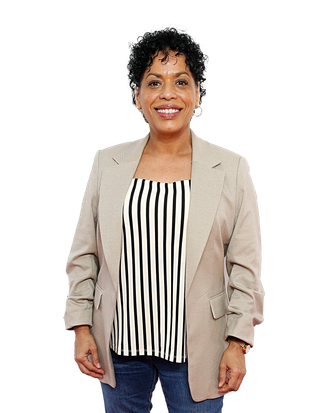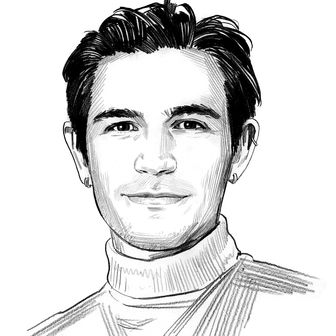
Tina was the beating heart of the Beef, and now she’s the beating heart of the Bear. The line cook and resident hazer journeys to proud sous-chef in The Bear season two, complete with a detour at culinary school that earns the respect and admiration of her fellow pupils — especially after a round of Freddy Fender’s “Before the Next Teardrop Falls” at post-class drinks. “That karaoke thing — I was so afraid of it. Liza was so afraid,” Liza Colón-Zayas, who plays Tina, tells Vulture of the episode-five highlight. “I have karaoke trauma, and it ended up in the script.”
Tina nails both the solo and her new role in Sydney’s kitchen back at the restaurant. While Tina has lost none of her edge, her new responsibilities challenge her ideas of herself. She’s an older Latina living in a world where Latinos who work in the kitchen usually aren’t noticed at all, but her joy this season comes from self-fulfillment — and the respect she has earned from her family at the Bear. Colón-Zayas believes this is just the beginning for Tina. “I’m hoping that this show continues to explore how we can nurture this population,” she says. “How could we protect what they have to offer that y’all didn’t think about?”
What was Tina’s relationship to cooking and hospitality when she was working with Mikey at the Beef?
Tina didn’t have any cooking training, you know? She just rolled with it. It was messy, but she could get through the day. Season one: I’m banging spatulas! Season two: Tina’s stepping up her game and being entrusted and encouraged. I trained intensely for one week with Chef David Waltuck, then more in my apartment with Chef Courtney Storer — filleting fish, slicing and dicing. That’s a huge difference.
Did she care about cooking when she was working with Mikey?
She cared to the degree that he cared — or that they all cared. It wasn’t pretty. Puerto Rican women show each other love by feeding each other. My family’s plates don’t get wiped for smudges. We don’t perfectly weigh and measure. We throw in ingredients until the ancestors tell you to stop. But it still comes from love. And Tina’s training is a way of her showing her appreciation for the love she has gotten from this group.
I cried when Syd asked Tina to be her sous, and what made me emotional was that Tina didn’t expect to be noticed in that way. What does this opportunity mean to her?
First, as an actor who struggled for 30 years, I get it. There is no acting necessary. Second is Hey, the people who work in our kitchens — are they really noticed? Whether it’s a Michelin kitchen or your neighborhood diner, how much of the humanity of the Latinos working there do we see on TV? I hope she can compel viewers to look at the Tinas they’ve come across in a different way. That’s why it’s so important to feel seen and entrusted with something when, for most of your adult life, you’ve had to just armor up and survive. Sydney understood that Tina had earned her trust.
You said you identified with Tina’s moment of opportunity. Can you expand on that from the perspective of a working actor?
I needed my theater community to stay in the game. With all the rejection, with all of the things I had to face, I had my theater community there for the last 30 years. You get those moments that sustain you until you get another job or you get validation from people you really respect. They can tell you’re struggling or that you should be at a certain place and you’re not. They have helped me not give up.
In a way, I did kind of give up. I was like, I’ll never be a series regular on a TV show. I didn’t ever quit the business, but I thought the best I could get would be to recur once in a while someday. I gave up that I would ever be on Broadway. To be on this show that is so beyond phenomenal — I still can’t believe it. I’m still pinching myself. So I get Tina. I get the value of landing on this opportunity to dream again.
Excellence in one’s work is a major theme of The Bear. What does excellence mean to Tina?
Living up to legitimate standards. Embracing what you don’t know.
Do you think she’d thought of herself that way prior to this?
No. With all of the stuff coming up against her — gentrification, ageism, misogyny — she has had to learn to adapt a certain way. She had to readjust her brain. All of her fears and insecurities are legit. She wished to be in that culinary school, but you’re looking around at people half your age who have the accreditation. If anything, she has learned that people who look like her are dispensable.
She learned a lot of skills at culinary school, but what do you think she learned about herself?
That she’ll survive. I don’t like karaoke, but it’s pushing yourself out of your comfort zone. Some people like it, some don’t — it’s fine. But she can do this. She can dream again.
I’m shocked to hear that you don’t sing, because I thought, She must have done musicals to have that voice. No?
No. [Points to her own vocal cords] She’s not reliable. I’m not trained as a singer. It’s not my thing. I’m glad it worked out. I’m glad she complied with me on that day.
What was it like to film that scene?
I was wishing I could have had a real shot, but we couldn’t do that. The Bear is such a freakishly special set. Everyone’s so kind and supportive. Everyone’s rooting for each other. I was mortified every time, but then I felt like, They love me anyway. And that’s the point of the scene, right? The point isn’t my singing capabilities. It’s getting past that awkward terror.
What is Tina learning in that moment with the microphone?
She’s learning to take a lot more deep breaths. Who knows the last time she went out for a drink. Much less with people half her age who, of course, are suspect in the back of her mind. She’s learning at warp speed that she has a lot more courage and strength than she thought. And that song by Freddy Fender is reaching back into her roots — a time when she was supported and loved. I didn’t know that Chris Storer would know that song! That song was playing on the radio all the time when I was a little kid. That made me comfortable.
It felt like the other students were noticing her for the first time.
She still has value, and hopefully that’ll transfer to the kitchen down the road. She can continue growing so that she can pay it forward to those new chefs in the kitchen. She has what they admire, what they’re striving for — and that it’s being noticed is a lifesaver for her. This whole restaurant has been a lifesaver.
Can you put into words what it is they admire?
Seeing me being kind of relentless in the kitchen. Even though my buddy Ebra is struggling, maybe they expected that to be the both of us. Maybe witnessing me trying to hold him down, give it my all, and still roll up at the bar. They’re not gonna scare me. I’ll take your pity invitation to the bar.
Is there a part of Tina that feels the same way as Ebra does?
We’re two peas in a pod in terms of our struggles. You’ve seen some things, and you wanna keep fighting, but your body is betraying you. I get his fear. If he fails, I could fail. We have to have each other. We’re the oldest ones there. I have to give him love. It’s tough love, but I recognize that could be me at any minute.
What is it about Tina that doesn’t allow her to give in to that?
Loyalty. If you could be in service to somebody else, you can build your character. Tina has always had to be a fighter, but it gets tiresome, and, in the past, her community at the Beef has held her up. Now she’s trying to keep that going.
But she has a son to support. Is there trepidation with the possibility of the restaurant failing?
My character isn’t as focused on that at this point. We made it this far, we are gonna make it.
Why is Syd and Tina’s relationship so strong?
She didn’t leave. I was trying to test it: This is not just a job. This is a family. And she didn’t leave. She doesn’t lose her mind. She didn’t give up on me. Now I’m pit-bull loyal to her.
What did Carmy giving Tina his knife mean to her?
He loses his mind in season one when he misplaces it. It speaks to his generosity. That’s not lost on Tina.
The finale felt momentous for Tina, because it’s the first time she’s putting those new culinary skills to the test. What was that like for her?
She had more confidence that things would work out than Carmy did. I’m not the one seeing hallucinations of Joel McHale working in a corner booth. She’s excited by it.
What does she feel when she’s listening to Carmy in the freezer?
I’ve been a mother figure to him. I’ve been a mother figure to all of them. I couldn’t believe that he felt like he failed us. We’re not homeless right now because of you! We have our moments when I’m just like, “Oh, come on baby. You didn’t do that. You’re crazy. Move on.” I got a few things in, even though I left him hanging. [Laughs.]
Well, you had to get your job done.
I mean, Sydney told me to do something.


